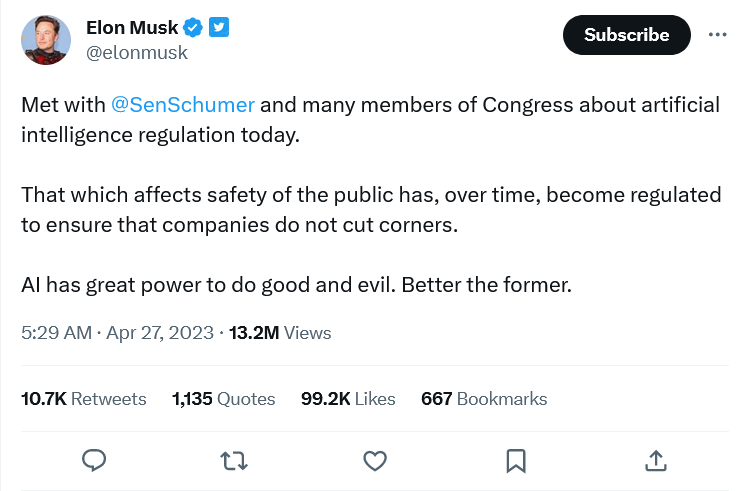America’s plans for AI regulation

• AI regulation is thought of as vital – but difficult.
•The speed at which generative AI is evolving is a barrier to effective regulation.
• Senator Schumer’s plan hopes to leapfrog the EU AI Act.
On June 21, Senate Majority Leader Chuck Schumer announced broad plans for AI regulation in the US – without endorsing anything too specific. Schumer’s plans, broad as they are, amount to the first attempt by a US lawmaker to rein in and regulate generative AI, in any way that’s comparable to the still-evolving Eurropean AI Act.

The idea of AI regulation is to make it safer and better.
The open-ended plans will begin with a minimum of nine panels identifying and discussing the hardest questions that regulations on AI will have to answer.
Some of the topics that will be covered at what Schumer calls “insight forums” include how to protect workers, national security and copyright, and to defend against “doomsday scenarios.”

Senator Schumer’s plan looks set to gain broad approval. Credit: Drew Angerer/Getty Images North America/Getty Images via AFP.
Each panel will be made up of experts from industry, academia and civil society, with the sessions beginning in September, 2023. The Senate will then turn to committee chairs and other vocal lawmakers on AI legislation to develop bills reflecting the panel discussions.
Schumer argued that the US solution to AI regulation could leapfrog existing regulatory proposals from around the world.
“If we can put this together in a very serious way, I think the rest of the world will follow and we can set the direction of how we ought to go in AI, because I don’t think any of the existing proposals have captured that imagination,” Schumer said, reflecting on other recent proposals such as the European Union’s draft AI Act, which was approved by the European Parliament the week before.
One of the concerns about Schumer’s proposal is that it could slow legislative efforts that are already underway.
Despite the speed at which AI is advancing, Schumer has stressed the importance of a deliberate approach, focusing on acquainting lawmakers with the basic facts of the technology and the issues it raises before legislating. Many lawmakers have admitted to not understanding the tech.
“I know many of you have spent months calling on us to act,” he said. “I hear you. I hear you loud and clear.”
But he described AI as a novel issue for which Congress lacks a guide.
“It’s not like labor, or healthcare, or defense, where Congress has had a long history we can work off of,” he said. “Experts aren’t even sure which questions policymakers should be asking. In many ways, we’re starting from scratch.”
Schumer described his plan as laying “a foundation for AI policy” that will do “years of work in a matter of months.”

Can the Schumer plan for AI regulation cover years of legal ground in mere months?
Schumer isn’t the first to attempt to get Congress up to speed on the implications of AI. In spring, Speaker Kevin McCarthy, (R) of California, and Representative Hakeem Jeffries, (D) of New York, the minority leader, convened a bipartisan briefing for members to discuss the challenges of A.I. regulation with experts; what Schumer has proposed is very similar.
There’s yet to be a bridging of the gap between the parties on how to approach AI regulation, although many of the moves are bipartisan. Several Democrats have called for a new federal agency to regulate AI. Senator Michael Bennet suggested that such a body could “provide the kind of expertise and oversight” necessary to take on large technology companies.
Moving toward AI regulation
In the first step towards giving lawmakers better insight into AI, on Tuesday 11 July, the White House briefed senators on artificial intelligence in a classified setting. It was the first ever classified Senate briefing on AI, held in a sensitive compartmented information facility at the US capitol.
Senator Schumer outlined his plan to bring together industry experts, leaders, stakeholders, and committees across the Senate to launch a bipartisan policy response to help shape AI in the United States.
Schumer told senators in a letter that the briefing would show how the US government is “using and investing in AI to protect our national security and learn what our adversaries are doing in AI… Our job as legislators is to listen to the experts and learn as much as we can, so we can translate these ideas into legislative action.”
With calls for caution from even the leaders in artificial intelligence, a swathe of legislation will no doubt be applied to the technology. Obviously it’s important that lawmakers understand the technology they’re legislating, but the speed at which boundaries are established could decide the future of human life as we know it.











